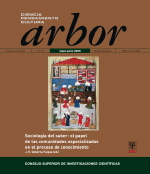Knowledge Transfer between Scientific Communities
DOI:
https://doi.org/10.3989/arbor.2008.i731.203Keywords:
Science, technology and innovation, scientific communities, knowledge transfer, scientific progress, technoscience, knowledge societyAbstract
Several epistemic innovations (Knowledge’s advances) may be considered to be a result of processes of knowledge transfer among different scientific scientific communities. In addition to generate knowledge in their different specialization’s fields, scientists use knowledge produced in diverse scientific fields. By reinterpreting von Hippel’s (2005) proposals, we analyze different sources of epistemic innovation and apply that model to concrete examples; suppliers (ISI), distributors (Nature, Science) and transdisciplinary users of the scientific knowledge. We conclude that transfer’ processes can generate innovation if they are produced between knowledge’ networks with different innovation’s nodes. This kind of proposals can be applied to different types of knowledge (science, technology, arts, culture) and even so to knowledge’s transmission to society.
Downloads
References
Bozemann, B. (2000): “Technology transfer and public policy: a review of research and theory”, Research Policy, 29, 627-655. doi:10.1016/S0048-7333(99)00093-1
Drucker, P. (1994): “Knowledge Work and Knowledge Society”, JFK School of Government, Harvard University.
Echeverría, J. (2003): La revolución tecnocientífica, Madrid, Fondo de Cultura Económica.
Echeverría, J. (2006): “Modelo pluralista de innovación: el ejemplo de las Humanidades”, en Ibarra, A.; Castro, J. y Rocca, L. (eds.), Las ciencias sociales y las humanidades en los sistemas de innovación, Estudios de Ciencia, Tecnología e Innovación, UPV/EHU, Cátedra Sánchez-Mazas, vol. 2, 135- 155.
Etzkowitz, H. y Leydesdorff, L. (2001): “The dynamics of innovation: From National Systems and ‘Mode 2’ to a Triple Helix of University-Industry-Government Relations”, Research Policy,29(2), 109-123. doi:10.1016/S0048-7333(99)00055-4
Gibbons, M.; Limoges, C.; Nowotny, H.; Schwartzman, S.; Scott, P. y Trow, M. (1994): The new production of knowledge. The dynamics of science and reseach in contemporary societies, Sage Publications.
Hippel, E. von (1988): The Sources of Innovation, New York, NY; Oxford Univ. Press (traducida al castellano con el título Usuarios y suministradores como fuentes de innovación, Madrid, COTEC, 2004).
Hippel, E. von (2005): Democratizing Innovation, Cambridge, Mass., MIT Press.
Lundvall, B. A. (1992): National Systems of Innovation: Towards a Theory of Innovation and Interactive Learning, Londres, Pinter Publ.
Nelson, R. R. (1993): National Systems of Innovation, Oxford, Oxford Univ. Press.
OECD/European Communities (2005): Oslo Manual: Guideliness for Collecting and Interpreting Innovation Data, 3.ª ed., OECD/EC.
Ziman, J. (2000): Real Science, Cambridge, Cambridge University Press.
Downloads
Published
How to Cite
Issue
Section
License
Copyright (c) 2008 Consejo Superior de Investigaciones Científicas (CSIC)

This work is licensed under a Creative Commons Attribution 4.0 International License.
© CSIC. Manuscripts published in both the printed and online versions of this Journal are the property of Consejo Superior de Investigaciones Científicas, and quoting this source is a requirement for any partial or full reproduction.All contents of this electronic edition, except where otherwise noted, are distributed under a “Creative Commons Attribution 4.0 International” (CC BY 4.0) License. You may read here the basic information and the legal text of the license. The indication of the CC BY 4.0 License must be expressly stated in this way when necessary.
Self-archiving in repositories, personal webpages or similar, of any version other than the published by the Editor, is not allowed.














